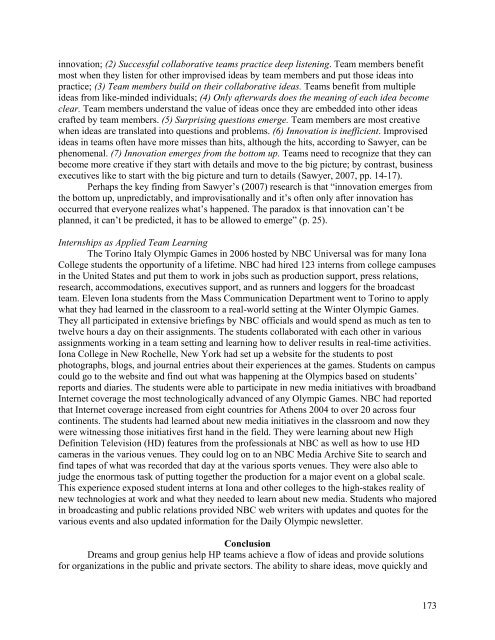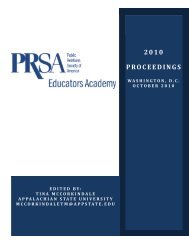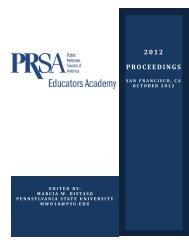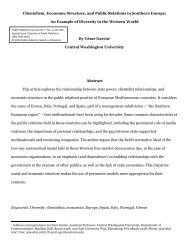2008 PROCEEDINGS - Public Relations Society of America
2008 PROCEEDINGS - Public Relations Society of America
2008 PROCEEDINGS - Public Relations Society of America
You also want an ePaper? Increase the reach of your titles
YUMPU automatically turns print PDFs into web optimized ePapers that Google loves.
innovation; (2) Successful collaborative teams practice deep listening. Team members benefit<br />
most when they listen for other improvised ideas by team members and put those ideas into<br />
practice; (3) Team members build on their collaborative ideas. Teams benefit from multiple<br />
ideas from like-minded individuals; (4) Only afterwards does the meaning <strong>of</strong> each idea become<br />
clear. Team members understand the value <strong>of</strong> ideas once they are embedded into other ideas<br />
crafted by team members. (5) Surprising questions emerge. Team members are most creative<br />
when ideas are translated into questions and problems. (6) Innovation is inefficient. Improvised<br />
ideas in teams <strong>of</strong>ten have more misses than hits, although the hits, according to Sawyer, can be<br />
phenomenal. (7) Innovation emerges from the bottom up. Teams need to recognize that they can<br />
become more creative if they start with details and move to the big picture; by contrast, business<br />
executives like to start with the big picture and turn to details (Sawyer, 2007, pp. 14-17).<br />
Perhaps the key finding from Sawyer’s (2007) research is that “innovation emerges from<br />
the bottom up, unpredictably, and improvisationally and it’s <strong>of</strong>ten only after innovation has<br />
occurred that everyone realizes what’s happened. The paradox is that innovation can’t be<br />
planned, it can’t be predicted, it has to be allowed to emerge” (p. 25).<br />
Internships as Applied Team Learning<br />
The Torino Italy Olympic Games in 2006 hosted by NBC Universal was for many Iona<br />
College students the opportunity <strong>of</strong> a lifetime. NBC had hired 123 interns from college campuses<br />
in the United States and put them to work in jobs such as production support, press relations,<br />
research, accommodations, executives support, and as runners and loggers for the broadcast<br />
team. Eleven Iona students from the Mass Communication Department went to Torino to apply<br />
what they had learned in the classroom to a real-world setting at the Winter Olympic Games.<br />
They all participated in extensive briefings by NBC <strong>of</strong>ficials and would spend as much as ten to<br />
twelve hours a day on their assignments. The students collaborated with each other in various<br />
assignments working in a team setting and learning how to deliver results in real-time activities.<br />
Iona College in New Rochelle, New York had set up a website for the students to post<br />
photographs, blogs, and journal entries about their experiences at the games. Students on campus<br />
could go to the website and find out what was happening at the Olympics based on students’<br />
reports and diaries. The students were able to participate in new media initiatives with broadband<br />
Internet coverage the most technologically advanced <strong>of</strong> any Olympic Games. NBC had reported<br />
that Internet coverage increased from eight countries for Athens 2004 to over 20 across four<br />
continents. The students had learned about new media initiatives in the classroom and now they<br />
were witnessing those initiatives first hand in the field. They were learning about new High<br />
Definition Television (HD) features from the pr<strong>of</strong>essionals at NBC as well as how to use HD<br />
cameras in the various venues. They could log on to an NBC Media Archive Site to search and<br />
find tapes <strong>of</strong> what was recorded that day at the various sports venues. They were also able to<br />
judge the enormous task <strong>of</strong> putting together the production for a major event on a global scale.<br />
This experience exposed student interns at Iona and other colleges to the high-stakes reality <strong>of</strong><br />
new technologies at work and what they needed to learn about new media. Students who majored<br />
in broadcasting and public relations provided NBC web writers with updates and quotes for the<br />
various events and also updated information for the Daily Olympic newsletter.<br />
Conclusion<br />
Dreams and group genius help HP teams achieve a flow <strong>of</strong> ideas and provide solutions<br />
for organizations in the public and private sectors. The ability to share ideas, move quickly and<br />
173
















